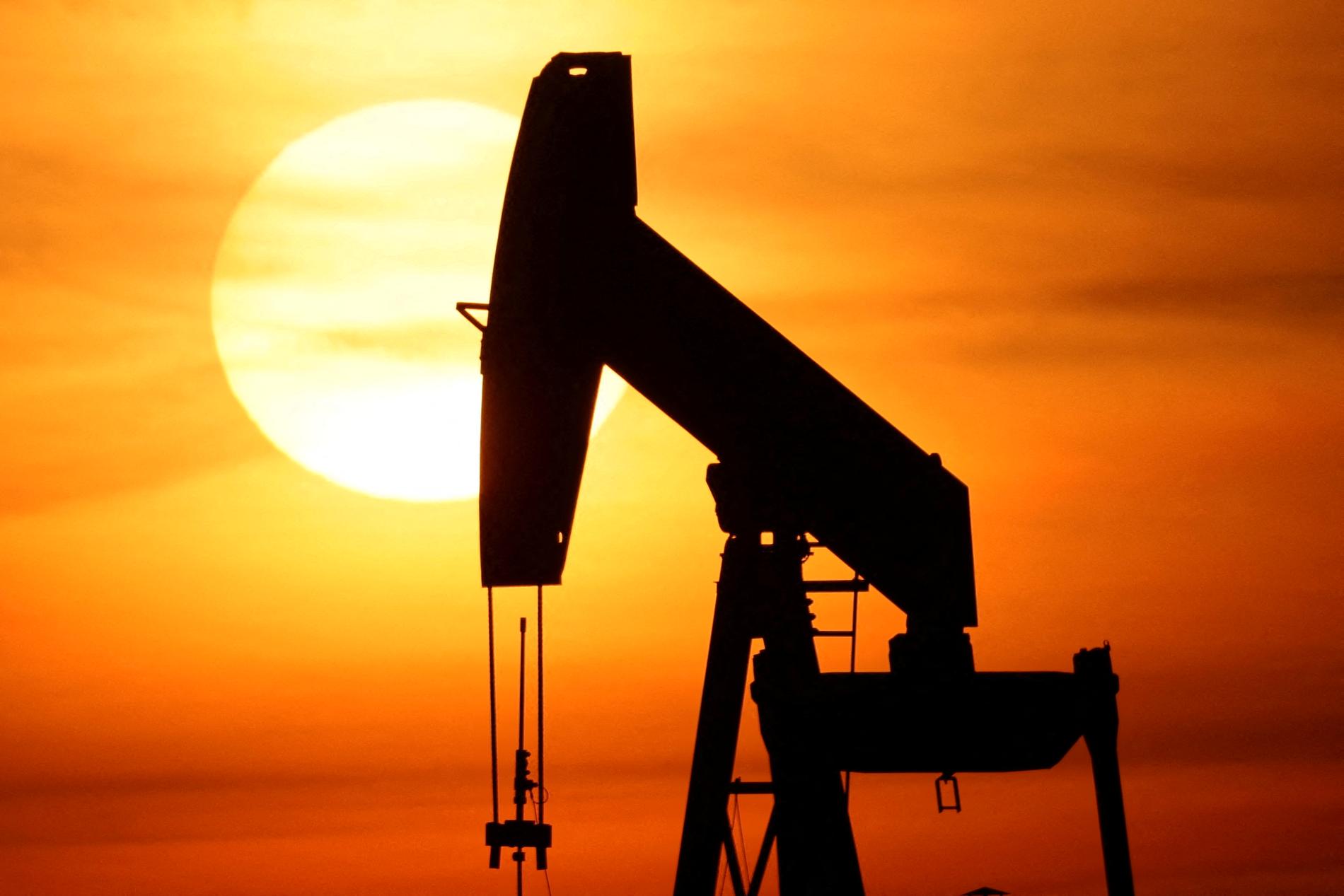Whether Opec succeeds or not will be the big question for oil prices next year, analysts believe.
Oil is pumped up in the sunset off Sommesous in France. Photo: PASCAL ROSSIGNOL / ReutersPublished:
Less than 20 minutes ago
Updated less than 10 minutes ago
In 2023, oil prices remained mostly in the 70s and 80s in dollars per barrel.
The production cuts of the oil group Opec+, led by Saudi Arabia, have been central to the oil market in the past year. Geopolitical unrest, most recently with the conflict in the Middle East this autumn, contributed to fluctuations.
Developments in the world economy, including demand from China, and the uncertainty about a possible recession have also been closely followed by the oil market.
When looking further into 2024, these will continue to be important factors, oil analysts believe.
Read on E24+
This is how the governor of the central bank explains the weak krone
– The big question for 2024 is whether OPEC manages to force the oil market into a supply deficit with adopted production cuts, or whether they will be pressured to cut even deeper to defend the oil price, says Helge André Martinsen, oil analyst at DNB Markets.
– If Opec does not succeed in 2024, then this could lead to a change in strategy from a price focus to a volume focus. In this respect, 2024 is a fateful year for the oil market.
Helge André Martinsen, oil analyst at DNB Markets Photo: Stig B. Fiksdal / DNB
Flattening “gives power to Opec”
The countries in Opec have several times in the past year announced production cuts to keep oil prices up.
The oil cartel, in which Saudi Arabia is important, consists of a number of oil-producing countries primarily in the Middle East and Africa. The expanded version of the grouping, Opec+, also includes Russia.
Saudi Arabia and Russia were among the countries that announced they were extending their voluntary cuts after the Opec meeting at the end of November.
– OPEC+ cuts what is necessary for an oil price of 80 dollars a barrel or higher, Schieldrop thinks about 2024.
Saudi Arabia’s Energy Minister Prince Abdulaziz bin Salman al-Saud on his way to the Opec summit in Vienna this summer. Photo: ALEX HALADA / AFP
Both he and Martinsen in DNB highlight American shale oil production as a factor to keep an eye on. Martinsen believes it “will flatten out in the first half of the year”, and provide support for a higher oil price. Schieldrop believes this production will go “almost sideways” in 2024.
– This gives power to Opec+ to steer the oil market where they want, the SEB analyst believes.
I believe at the top near 100 dollars
The oil price (burnt spot) remained above 70 dollars a barrel throughout 2023. At its highest in September, it was over 95 dollars, before falling back through November and the beginning of December.
At the end of the year, the oil price is at USD 77 a barrel, down more than 10 percent since the end of 2022.
Martinsen at DNB Markets and Bjarne Schieldrop, commodity analyst at SEB, both believe that the price will continue in roughly the same range through 2024.
Schieldrop expects the average Brent price to be USD 85 a barrel. He envisions a top of $100 and a bottom of $65. Martinsen and DNB Markets believe the oil price will remain in the range of 70–95 dollars a barrel through 2024.
– We believe the weakest period for oil prices will be at the start of 2024, characterized by a somewhat weak oil market balance, but partly supported by high geopolitical risk in the Middle East, says Martinsen in DNB Markets.
After that, the analyst believes that prices will rise for the rest of the year, partly as a result of the declining “momentum in production growth outside Opec” and flattening of American shale oil production.
– Still a very troubled world
Geopolitical unrest has characterized the oil market throughout 2023, although fluctuations and price peaks were not as strong as in the first part of the Ukraine war in 2022.
The Middle East has been central to the unrest throughout the autumn. Hamas’s attack on Israel in October and the subsequent war in Gaza produced a brief, but no lasting recovery. The same can at least for now be said about the attacks on ships in the Red Sea in recent weeks.
Bjarne Schieldrop is chief strategist for raw materials at SEB Photo: Lise Åserud / NTB
Geopolitical disturbances will cause the price to bounce in 2024 as well, believes Bjarne Schieldrop.
– Still a very troubled world with friction and major or minor disturbances in the supply of oil from time to time, he predicts.
– Economic acceleration wins in the end
When it comes to what demand will look like, Martinsen believes that “growth in world oil demand will slow down sharply in 2024”.
Schieldrop, for his part, expects demand to “surprise on the upside”. Among other things, he points to pent-up demand in the wake of the corona pandemic, and believes that demand is increasing by more than 1.3 million barrels per day compared to the previous year.
Saudi Arabia is central to the oil group Opec. Here from one of the facilities of the state oil company Saudi Aramco. Photo: Amr Nabil / AP
By comparison, the International Energy Agency (IEA) estimates that world oil demand will increase by 1.1 million barrels per day next year, according to the organisation’s latest oil market report. That is down from an estimate of 2.3 million barrels per day this year.
Opec believes it will hold up better in its December report that demand will increase by 2.2 million barrels per day in 2024.
High price growth and sharp interest rate increases in the wake of the corona pandemic have characterized the economy in recent years.
Economists have discussed whether this will lead to a sharp downturn and recession in the world economy, or whether it will be possible to achieve a “soft landing” where price growth will come down without there being any economic sudden stop.
– Global economic acceleration wins in the end. The oil price fluctuates between “recession” and “acceleration”, but inflation disappears like dew before the sun and “acceleration” wins in the end, Schieldrop believes.
2023-12-31 18:02:57
#fateful #year #oil #market


